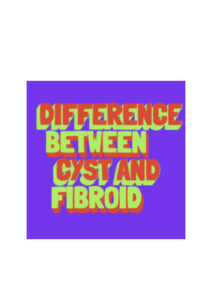What's the difference between cysts and fibroids? Well, while both cysts and fibroids are growths that impact women, they've very different from each other. In this post, we'll highlight those differences to help you figure out which might be the source of your symptoms and concerns.

As their name suggests, ovarian cysts form in or on your ovaries. They are non-cancerous, fluid-filled sacs. And they may grow unnoticed in some women, while they cause disruptive symptoms for others.
Uterine fibroids are muscular growths that form in the uterine lining, the uterine cavity, or on the uterus. Left untreated, small fibroids may grow into large ones. And, like cysts, they may not cause symptoms initially, but could eventually cause painful, disruptive symptoms.
Depending on their size and location, fibroids may cause symptoms such as heavy periods; pelvic pain and painful sex; bloating and/or weight gain; frequent urination and/or constipation; and a distended abdomen.
Similarly, cysts also vary in sizes, and can cause several different symptoms. These include thigh and back pain; tender breasts; and sharp or dull abdominal pain that's typically limited to one side. If cysts rupture, they can cause sudden and severe symptoms, and they will require immediate medical attention.
Confusingly, there may be some overlapping symptoms with fibroids and ovarian cysts. In some cases, cysts can also interfere with your menstrual cycle, or cause you to bleed between periods. they can also impact your ability to urinate; cause you to gain weight; and make sex painful.
Once you tell your gynacologist about the symptoms you're experiencing, you will likely need further testing to diagnose a cyst or fibroid. Typically, the tests will include an ultrasound of the pelvis or abdomen. You may also need an MRI. Once these tests are complete, you should know whether fibroids or ovaries are causing your symptoms.
If your cyst or fibroid aren't causing symptoms, you may choose to delay treatment, but you will need regular monitoring to make sure they don't grow larger and start causing problems.
When deciding how to treat your cysts, options will depend on your age, and whether you hope to start a family or are already in menopause. Many cysts respond well to hormonal contraceptives. But some will need to be surgically removed.
If you are experiencing fibroid symptoms, or want to become pregnant, there are a range of treatment options. Here in our Houston fibroids practice, we offer Uterine Fibroid Embolization, a minimally invasive treatment that doesn't require an overnight hospital stay or genre anesthesia.
If you're experiencing symptoms like heavy periods, bloating and pelvic pain, it's important to speak to your doctor right away. Once the healthcare provider determines whether you have a cyst or fibroid, you can begin exploring treatment options. And, if fibroids are the source of your symptoms, we invite you to schedule a treatment option consultation with our team of Houston area specialists.

Scheduling
Please contact our dedicated specialists to schedule a consultation today.
2024 Houston Fibroids. All rights reserved. Website Design by Healthcare Success